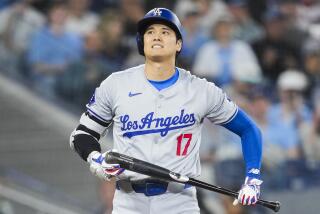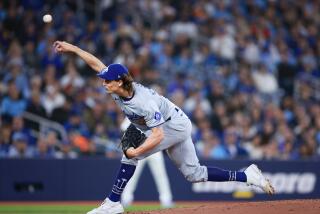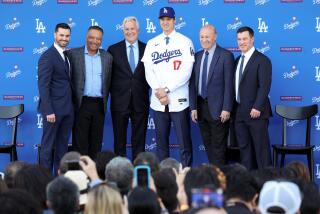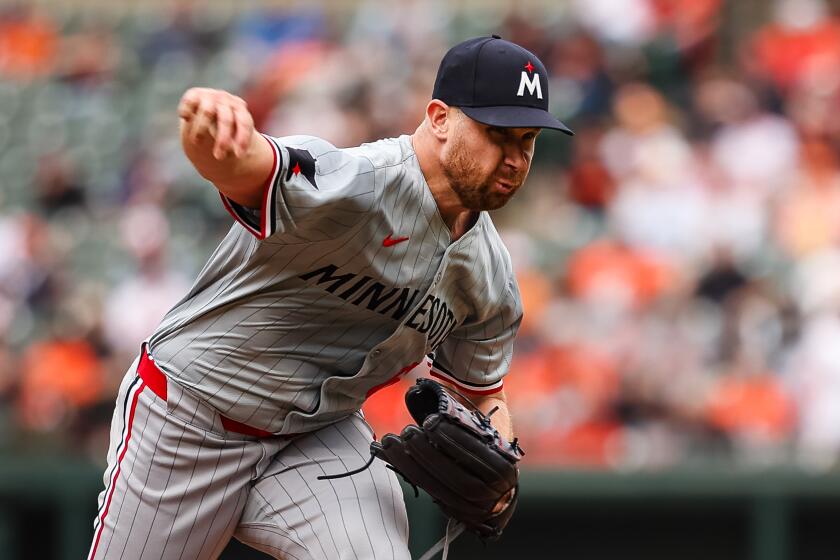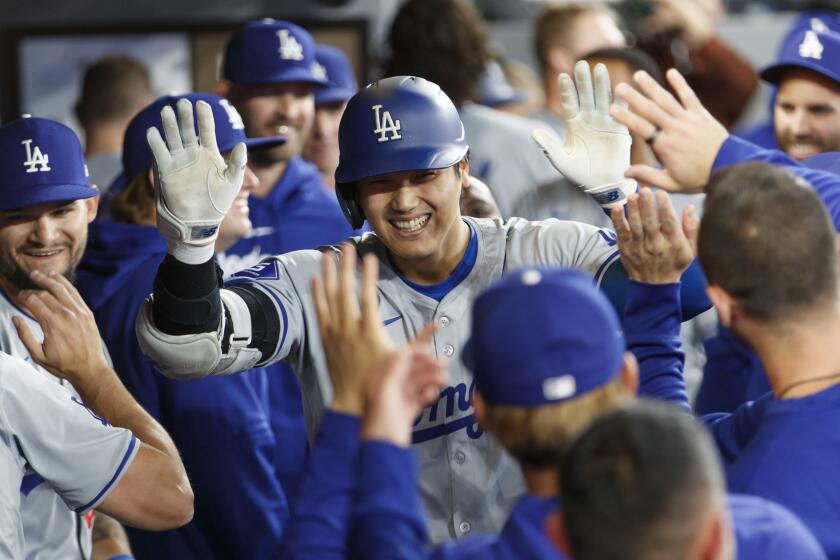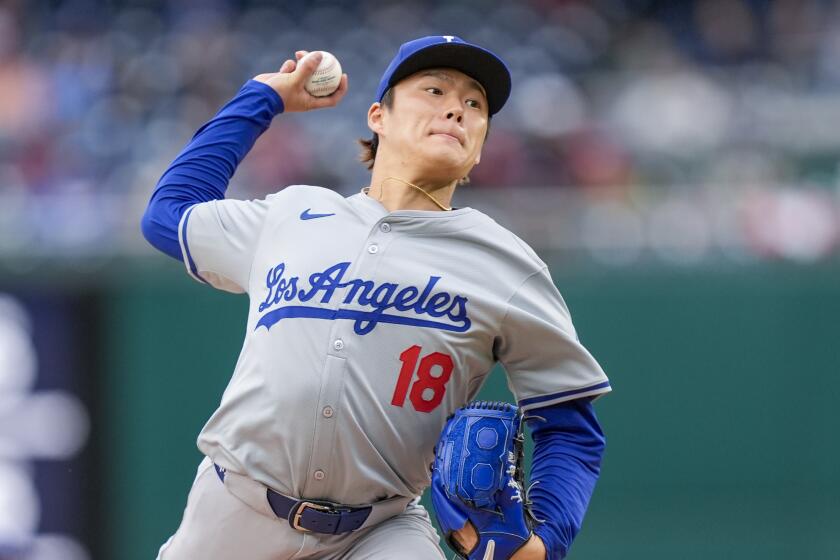Are Dodgers being cost-effective, or just cheap?
All spring Zach Lee was telling anyone who would listen that he was more interested in playing college football than professional baseball.
Apparently, the Dodgers weren’t listening. Because in June they drafted him anyway and two months later Lee, true to his words, is taking snaps at Louisiana State while the Dodgers are left facing a Monday evening deadline to talk him back to baseball or forfeit their first-round pick.
And that’s going to be hard to do since Lee says he and the Dodgers haven’t talked since draft day, two days before he started summer school at LSU.
“I haven’t really heard anything from them,” Lee told reporters at LSU football media day last week. “They contacted me to let me know they drafted me. I haven’t heard from them since.
“As far as I’m concerned, I’m here to stay until something else happens. And I don’t really see it happening.”
Assuming Lee is telling the truth — and the Dodgers haven’t challenged his version of events — the story raises some interesting questions. Why, for example, did the Dodgers use their precious top draft pick on a guy the rest of baseball considered unsignable? And once they committed to taking him, why haven’t they committed to signing him?
One popular theory says the cash-strapped Dodgers selected Lee with the 28th overall pick because he was unlikely to sign, saving the team more than $1 million in bonus money.
And given the Dodgers’ recent thrifty history — the total amount the team has spent on draft signings has ranked it among the five cheapest organizations in baseball in four of the last five seasons — that theory seems plausible.
Logan White, the Dodgers’ chief of scouting, challenges such thinking.
“We didn’t draft anyone to go cheap,” says White, who politely declined to talk about the matter in depth.
“I don’t see how talking about the subject before the deadline is over makes sense,” he said.
But White has a defender who will speak in draft expert Jim Callis, executive editor at Baseball America.
“To me, that makes no sense,” Callis says of the conspiracy theory.
If the Dodgers fail to sign Lee, Callis points out, they’ll get two first-round picks next season. So rather than saving $1 million, all they’re really doing is deferring that payment.
“I can’t believe that they’re actually going to run their business to where you’re never going to sign the first-round picks,” he says. “If you wanted to be cheap, what you do is you would overdraft a guy and sign him for $700,000 or something.”
Besides, if you were going to take a chance on someone, Zach Lee is a guy you’d want to do that with. A lanky 6-foot-4, 195-pound right-hander with a mid-90s fastball, he is clearly a first-round talent.
But he also ranked as one of the nation’s top 10 high school quarterbacks after throwing for 2,565 yards for Texas’ McKinney High last fall, and he announced early that he wanted to play football at LSU. That left many baseball organizations projecting it would take a $5-million bonus to get him to change his mind.
The Dodgers, convinced he was the best player available, apparently decided to test that theory — as they did with Colorado prep right-hander Kevin Gausman, a hard thrower also committed to LSU. Gausman, the Dodgers’ sixth-round pick, wants a $4-million bonus and given that $4 million is nearly twice what the Dodgers spent to sign Clayton Kershaw, that’s not about to happen.
Yet no matter how the Dodgers spend their money, it’s clear they’re not investing nearly as much in either the draft or international free-agent signings as they did in the past. The Dodgers’ player-development system was once the envy of baseball, and as recently as 2005 Baseball America ranked the team’s minor league talent as the best in the game.
But that spring, the team’s second under owner Frank McCourt, the Dodgers did not have a first-round selection and spent $2.2 million in the draft. Only the Giants spent less.
And in the last two seasons no team has been cheaper in the draft. Partly as a result, the Dodgers’ farm talent was ranked among the worst in baseball at the start of this season.
So who’s to blame? Under White the Dodgers had two of the best drafts of the last decade, signing James Loney, Jonathan Broxton, Delwyn Young, James McDonald, Russell Martin, Chad Billingsley, Matt Kemp and Andy LaRoche in 2002-03. A year later they took Blake DeWitt in the first round and signed catcher Carlos Santana as an international free agent.
More than half those players are now with other organizations, four of them traded because the Dodgers didn’t want to take on salary in the deals that brought them Manny Ramirez, Casey Blake, Ted Lilly and Octavio Dotel.
“They’ve overpaid. They’ve given up higher costs in prospects in order to not take on payroll,” says Callis, who rates the Dodgers farm system now as “average.”
“I don’t think it’s falling apart,” he says. “I just don’t think it’s as productive as it used to be.”
As for the draft, well, Callis says the Dodgers have been average spenders there, too, choosing to keep their bonus offers close to the “slot” payments the commissioner’s office recommends for each round.
Through the first 10 rounds last year, for example, the team’s combined bonuses were just 4% over slot. The average for the other 29 teams was 20% higher.
“They didn’t go over slot, but they weren’t cutting corners and signing guys super cheap,” Callis says. “You’re the Los Angeles Dodgers. You’re in Los Angeles. Could you spend over slot? Sure, you could. But they just choose not to.”
And that, more than any secret conspiracy, is why Zach Lee is likely to be throwing passes for LSU rather than fastballs for the Dodgers.
kevin.baxter@latimes.com
Clicking on Green Links will take you to a third-party e-commerce site. These sites are not operated by the Los Angeles Times. The Times Editorial staff is not involved in any way with Green Links or with these third-party sites.
More to Read
Are you a true-blue fan?
Get our Dodgers Dugout newsletter for insights, news and much more.
You may occasionally receive promotional content from the Los Angeles Times.
